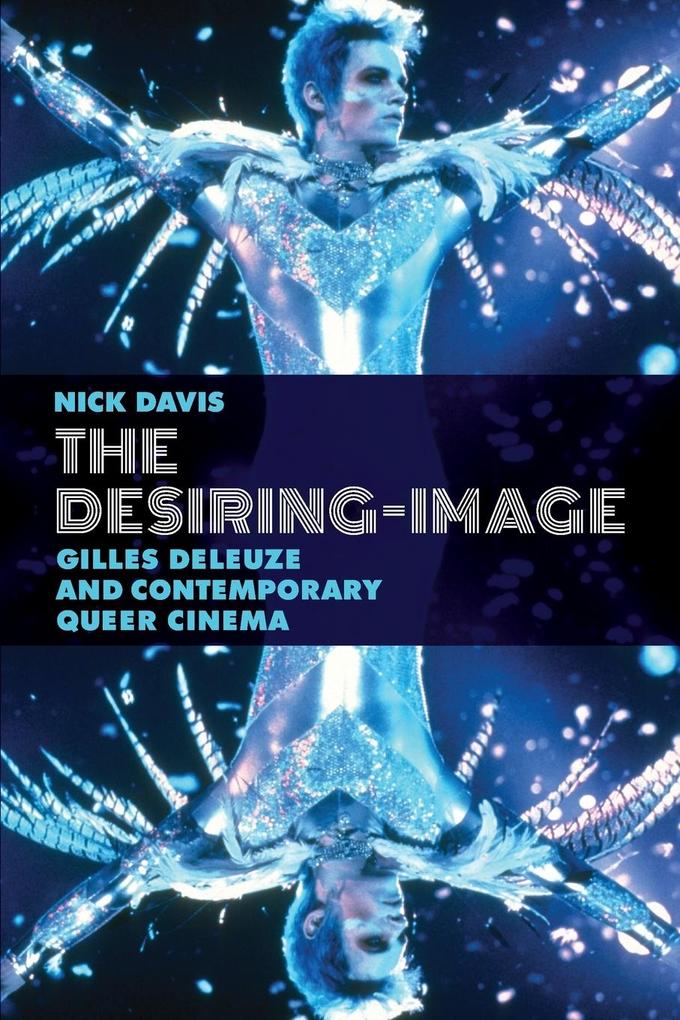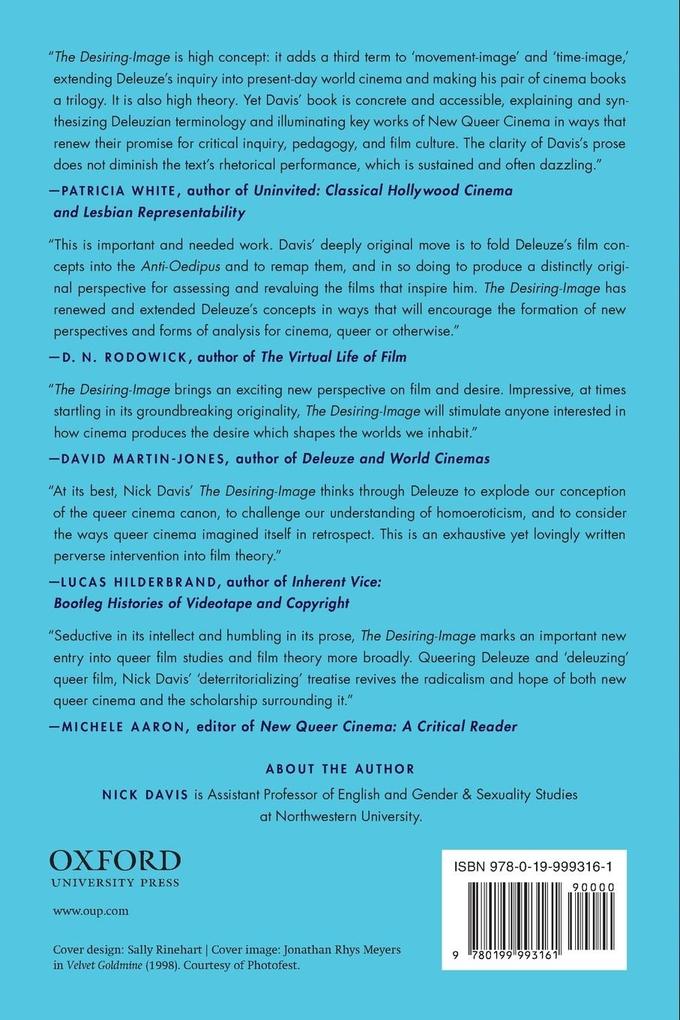
Zustellung: Di, 17.06. - Fr, 20.06.
Versand in 6 Tagen
VersandkostenfreiBestellen & in Filiale abholen:
The Desiring-Image redefines queer cinema as a kind of filmmaking that conveys sexuality and desire as fundamentally fluid for all people, exceeding familiar stories and themes in many LGBT movies.
Inhaltsverzeichnis
- TABLE OF CONTENTS
- Acknowledgments
- List of Abbreviations
- Introduction
- The Triple Womb
- Queering the Cinema Books
- New Queer Is... New Queer Ain't
- Seven Pillars of Schizo Homo Pomo
- A Word on Orientation, or Around 1991
- Preview of Coming Attractions
- Chapter 1: "Beyond Gay": Dead Ringers and Queer Perceptions
- "We're Just Not Sure What Kind It Is"
- Dissenting from "A Dissenting View"
- Mutant Textuality
- Perceptions of Perception: Movement, Time, Subtraction
- Perceptions and Desire: Types of Flows
- Out-of-Fields and the Desiring-Image
- The Desiring-Images of Dead Ringers
- First Out-of-Field: The Mantles vs. the World
- Second Out-of-Field: The Love that Keeps Almost Speaking Its Name
- Third Out-of-Field: The Triple-Womb and the "Either... Or... Or..."
- Fourth Out-of-Field: Impulse and Immanence
- The Desiring-Image as Relation-Image
- Chapter 2: Hard Bodies and Sex Blobs: Deterritorializing Desire in Naked Lunch
- and Shortbus
- Innaresting Sex Arrangements
- Peaks, Sheets, and Series
- "Everything Is Permitted": Incompossibilities of Desire
- Schizos and Counterpublics
- If on a Summer's Night a Sex-Blob
- Sounds, Stutters, and Scatterplots
- A Kafka High, or a New Low?: Quandaries of the Minor
- Shortbus: The Queer Politics of "Actual" Sex
- Does This Bus Only Make One Stop?
- Chapter 3: "Something in Her Face": Queering the Affection-Image in
- The Watermelon Woman
- Who Is She, and What Is She to You?
- The Riddle of the Lesbian Affection-Image
- Like Clockwork, or How to Make a Face
- Facing Elsie, and the Mystery of the Other Person
- Black Lesbians and Their Others
- Peaks of Present, or What Ever Happened to Lesbian Community?
- Sheets of Past and Centers of Indetermination
- A Singular Face, Implying Multitudes
- Deflective Unities and Oracular Chores
- Faces in the Crowd
- Facing Forward
- Chapter 4: Brother to Brother and Adventures in Queer Crystallography
- Queer Crystallography
- Crystals, Then and Now
- The Four Types
- Looking for Bruce / Looking for Perry
- Through a Crystal-Image, Darkly
- What's Sex Got to Do with It?
- Chapter 5: Crystal-Queer Economies: Beau travail
- What's Money Got to Do with It?
- The Oyster and the Book in Blood
- The Broken Compass and the Three Economies
- Beau travail, or the Ambiguities
- Compound Crystals
- Bachelors and Belles transitions
- Chapter 6: Theses on a Philosophy of Queer History: Velvet Goldmine
- Changing the World / Changing Ourselves
- Angels, Aliens, and Orphans
- Point A to Point B
- Wild Cards and Unexpected Critiques
- Toward Productive Ends
- The Minors and the Miners
- Conclusion
- The Pin and the Pearl
- Glossary
- Works Cited
Produktdetails
Erscheinungsdatum
01. Juli 2013
Sprache
englisch
Seitenanzahl
330
Autor/Autorin
Nick Davis
Verlag/Hersteller
Produktart
kartoniert
Gewicht
563 g
Größe (L/B/H)
234/156/19 mm
ISBN
9780199993161
Entdecken Sie mehr
Pressestimmen
"The Desiring-Image is high concept: it adds a third term to 'movement-image' and 'time-image, ' extending Deleuze's inquiry into present-day world cinema and making his pair of cinema books a trilogy. It is also high theory. Yet Davis's book is also concrete and accessible, explaining and synthesizing Deleuzian terminology and illuminating key works of New Queer Cinema in ways that renew their promise for critical inquiry, pedagogy, and film culture. The clarity of Davis's prose does not diminish the text's rhetorical performance, which is sustained and often dazzling."--Patricia White, author of Uninvited: Classical Hollywood Cinema and Lesbian Representability"This is important and needed work. Davis' deeply original move is to fold Deleuze's film concepts into the Anti-Oedipus and to remap them, and in so doing to produce a distinctly original perspective for assessing and revaluing the films that inspire him. The Desiring-Image has renewed and extended Deleuze's concepts in ways that will encourage the formation of new perspectives and forms of analysis for cinema, queer or otherwise."--D.N. Rodowick, author of The Virtual Life of Film"The Desiring-Image brings an exciting new perspective on film and desire. Impressive, at times startling in its groundbreaking originality, The Desiring-Image will stimulate anyone interested in how cinema produces the desire which shapes the worlds we inhabit."--David Martin-Jones, author of Deleuze and World Cinemas"At its best, Nick Davis' The Desiring-Image thinks through Deleuze to explode our conception of the queer cinema canon, to challenge our understanding of homoeroticism, and to consider the ways queer cinema imagined itself in retrospect. This is an exhaustive yet lovingly written perverse intervention into film theory."--Lucas Hilderbrand, author of Inherent Vice: Bootleg Histories of Videotape and Copyright"Seductive in its intellect and humbling in its prose, The Desiring-Image mark
Bewertungen
0 Bewertungen
Es wurden noch keine Bewertungen abgegeben. Schreiben Sie die erste Bewertung zu "The Desiring-Image" und helfen Sie damit anderen bei der Kaufentscheidung.










